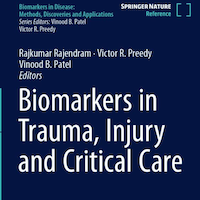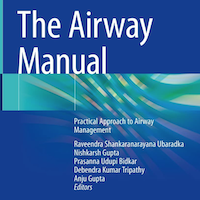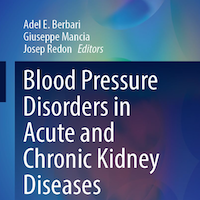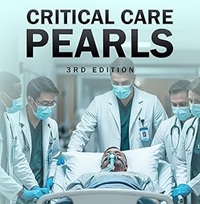Tag: treatment
Power to the Patient: Rethinking Pain Control in the ICU
This scoping review of 12 relevant studies suggests that Patient-Controlled Analgesia (PCA) offers a promising path toward faster and more stable pain management for ICU patients. By allowing patients to self-administer small... read more
The Great Escape: How ECMO Weaning Shifts Antibiotic Levels
This case study explores the complex pharmacological landscape of treating a 47-year-old patient with severe renal impairment and pneumonia using ceftazidime–avibactam (CAZ-AVI) while on VA-ECMO support. Researchers... read more
Sepsis Management: PIRO and MODS
This book is unique in approaching multiple organ dysfunction syndrome (MODS) from the perspective of its pathophysiological mechanism, and addressing aspects that are overlooked in most of the available literature. Eminent... read more

Biomarkers in Trauma, Injury and Critical Care (Biomarkers in Disease: Methods, Discoveries and Applications)
This handbook systematically presents biomarkers for traumatic injuries. The book covers topics such as traumatic brain injury, liver injury, burn severity, muscle heart damage, and acute inflammation in polytrauma and their... read more

Refining Neuromuscular Blockade Use in ARDS
Acute Respiratory Distress Syndrome (ARDS) remains a critical challenge in medicine, persistently linked to mortality rates exceeding 30% despite extensive research over the years. The lack of effective drug treatments means... read more
Systemic Corticosteroids for Inflammatory Disorders in Pediatrics
This comprehensive volume provides current state of the art of the use of corticosteroids in the pediatric patient. It consists of 14 chapters written by leading authors from different countries. The first chapters cover... read more

Oral Levothyroxine: A Life-Saving Alternative for Myxedema Crisis
An observational study analyzing 12 adult patients (median age 66, 50% female) diagnosed with myxedema coma at a tertiary center between 2011 and 2021 highlights the efficacy of high-dose oral levothyroxine as a viable treatment,... read more
ICU Protocols: A Step-wise Approach, Vol II
The second edition of this highly successful book includes up-to-date notes on the step-wise management of clinical emergencies encountered in everyday intensive care units (ICU). Each thoroughly revised chapter provides... read more

Handbook of Evidence-Based Critical Care
This updated and revised edition of the classic bedside pocket reference remains the gold standard in critical care medicine. The new edition maintains Dr. Marik's trademark humor and engaging writing style, while adding... read more

The Sepsis Tightrope: Tracking Antibiotic Levels to Hit the Sweet Spot in the ICU
This prospective, observational study examined the beta-lactam antibiotic concentrations in the crucial first 48 hours of treatment for patients with community-acquired sepsis in the Intensive Care Unit (ICU). The study... read more
Predicting Transfusion Risks to Power Safer Blood Management
This systematic review analyzed the use of Artificial Intelligence (AI) models over the past decade in identifying and predicting Adverse Transfusion Reactions (ATRs) and their implications for clinical management. The... read more
Hemodynamics: The Key to Noninvasive Ventilation (NIV) Success
This large multicenter observational study found that hemodynamic instability—defined as needing vasopressor support within 24 hours of starting NIV—was linked to a significantly higher risk of NIV failure. The crucial... read more
Intra-Abdominal Hypertension – Core Critical Care
The most popular book at ISICEM meeting. Despite increasing interest in intra-abdominal hypertension (IAH) and abdominal compartment syndrome (ACS) as causes of significant morbidity and mortality among the critically ill,... read more

Sepsis Danger: High Ferritin Levels Flag Risk of Acute Liver Injury
This study used data from the MIMIC-IV database (training group) and an external hospital dataset (clinical validation group) to develop and validate a prediction model for sepsis-associated acute liver injury (SALI). The... read more
Sepsis’s Silent Heart Attack: Decoding and Targeting the Multi-Layered Cardiac Failure
This review synthesizes the current understanding of sepsis-induced myocardial dysfunction (SIMD), moving the field beyond supportive care toward precision therapies. While challenges remain in addressing the diverse nature... read more
The Antibiotic Balancing Act in ICU: Optimizing Use to Beat Resistance and Save Lives
The continuous fight against antibiotic resistance demands a routine and multidisciplinary strategy for antibiotic optimization in the ICU. Regular review and updating of these practices, based on local data on pathogens... read more
Handbook for Venous Thromboembolism
A truly practical guidebook for anyone who needs the key information on the diagnosis, management and prevention of venous thromboembolism. Specific areas of focus include understanding the risk factors for VTE and the role... read more

Medication Management: Spontaneous vs. Traumatic Intracerebral Hemorrhage (sICH vs. tICH)
Pharmacological management for BP control and seizure prophylaxis differs between tICH and sICH. ICH etiology should be accounted for in determining appropriate BP goals and the necessity of seizure prophylaxis. Intracerebral... read more
Septic Shock MAP Targets: Homogeneous Response, Heterogeneous Harm
This study, which analyzed 776 patients with septic shock, found that overall, there was no significant difference in the response (no heterogeneity) to different blood pressure targets, particularly concerning the primary... read more
Mapping the Brain’s Blueprint: Precision Critical Care for Acute Brain Injury
Current management strategies for complex ABI conditions—which are associated with high mortality and morbidity—often rely on a "one-size-fits-all" approach derived from trials on heterogeneous patient populations. This... read more
Calming the Storm: Probiotics Significantly Modulate Inflammatory Cytokines in Pediatric Sepsis
This randomized double-blind study investigated the effect of probiotic treatment in children admitted to the pediatric intensive care unit (PICU) with sepsis. Inflammatory Improvement: Probiotic therapy led to a significant... read more
Peripheral Perfusion-Targeted Resuscitation Improves Outcomes in Septic Shock
This study, which included 200 sepsis and septic shock patients in the emergency department, compared the effectiveness of management guided by peripheral perfusion measurements against standard care protocols. The study... read more








